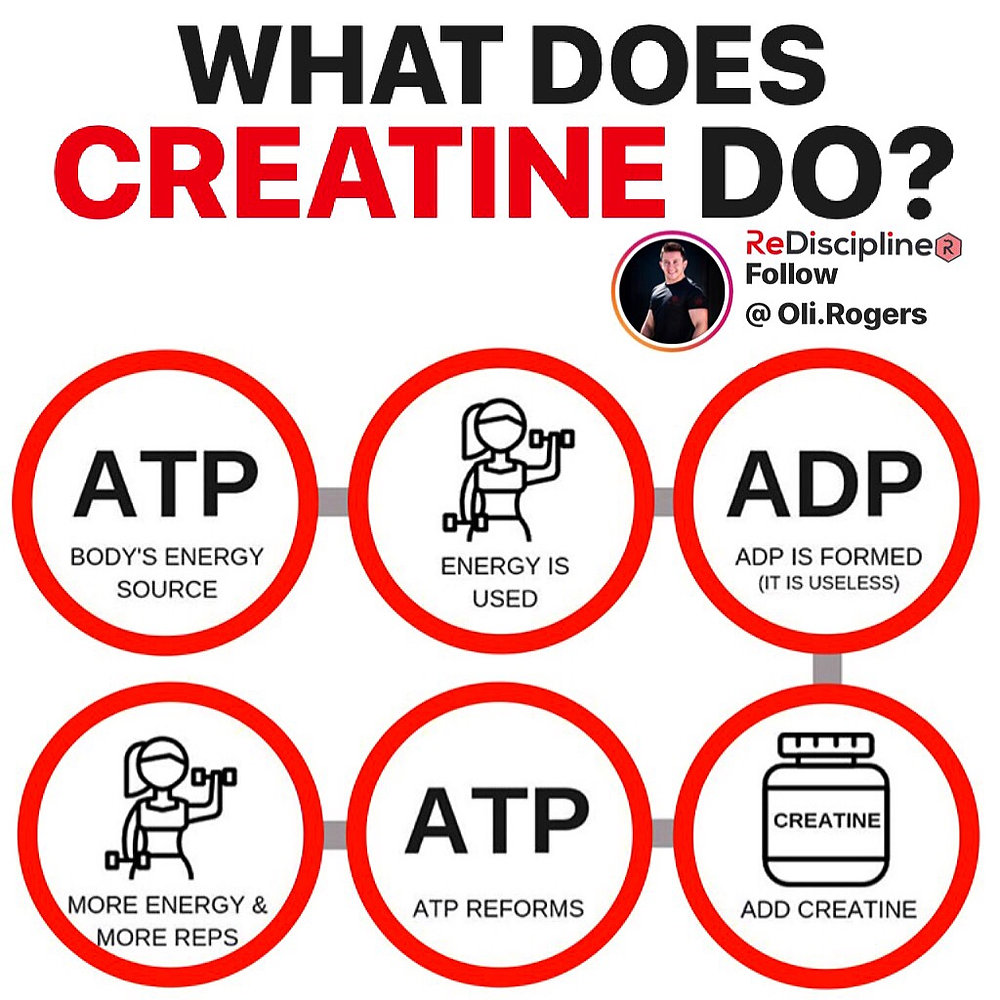What Is Creatine And How Does It Work?

Table of Contents
What is Creatine?
Creatine is a nitrogenous organic acid that's naturally produced in the body, primarily in the liver, kidneys, and pancreas. It's also found in small amounts in certain foods, particularly red meat and fish. However, the levels found naturally in the diet are often insufficient to significantly impact muscle creatine stores. This is where creatine supplementation comes into play.
Creatine's Natural Occurrence
Your body naturally produces creatine to help power your muscles. This process involves the combination of three amino acids: glycine, arginine, and methionine. The creatine produced is then transported to the muscles where it plays a critical role in energy production.
Creatine Supplementation
Creatine supplementation significantly increases the concentration of creatine in your muscles. This increased availability leads to a number of performance-enhancing effects. While various forms of creatine exist, such as creatine monohydrate, creatine HCL, and creatine ethyl ester, creatine monohydrate remains the most extensively researched and widely recommended form due to its proven effectiveness and safety.
- Creatine is a naturally occurring compound.
- It's synthesized in the liver, kidneys, and pancreas.
- Found in small amounts in meat and fish.
- Supplementation boosts muscle creatine stores.
- Various forms of creatine exist, with creatine monohydrate being the most researched.
How Does Creatine Work?
Creatine's primary function is to facilitate the regeneration of adenosine triphosphate (ATP), the body's primary energy currency, particularly during high-intensity exercise. This enhanced ATP regeneration translates directly into improved performance and muscle growth.
ATP Production
During intense exercise, your muscles rapidly deplete their ATP stores. Creatine, in the form of phosphocreatine (PCr), acts as a reservoir, quickly donating a phosphate group to ADP (adenosine diphosphate) to reform ATP. This allows for sustained energy production during short bursts of intense activity like weightlifting or sprinting.
Muscle Growth and Strength
Creatine's impact on muscle growth and strength is multifaceted. Besides its role in ATP production, creatine promotes muscle protein synthesis – the process of building muscle tissue. Furthermore, creatine increases water retention within muscle cells, leading to increased cell volume and a feeling of "fullness." This increased hydration contributes to enhanced muscle size and strength.
- Creatine helps replenish ATP, the body's primary energy source.
- This leads to improved performance during short bursts of intense activity.
- Facilitates muscle protein synthesis.
- Increases muscle cell hydration (water retention), leading to increased size and strength.
Benefits of Creatine Supplementation
The benefits of creatine supplementation extend across various aspects of athletic performance and potentially even cognitive function.
Enhanced Athletic Performance
Creatine supplementation is widely used by athletes across various disciplines to enhance their performance. The increased ATP availability and muscle growth contribute to:
- Improved strength and power output in weightlifting and powerlifting.
- Increased speed and power in sprinting and other high-intensity activities.
- Enhanced performance in high-intensity interval training (HIIT).
- Faster recovery times between sets and workouts.
Cognitive Function
While research is ongoing, some studies suggest potential cognitive benefits of creatine supplementation, particularly in individuals with certain cognitive impairments. However, more research is needed to definitively establish these benefits in healthy individuals.
- Improved strength and power output.
- Increased muscle mass and hypertrophy.
- Enhanced high-intensity exercise performance.
- Potential cognitive benefits (needs more research).
- Faster recovery times.
Creatine Safety and Side Effects
Creatine is generally considered safe when used appropriately. However, like any supplement, potential side effects exist.
Potential Side Effects
The most commonly reported side effects are generally mild and temporary:
- Weight gain: Primarily due to water retention in muscles.
- Gastrointestinal issues: Including bloating, nausea, and diarrhea, often related to dosage or individual sensitivity.
- Muscle cramps: In some individuals, although proper hydration can help mitigate this.
Dosage and Usage
The typical recommended dosage for creatine monohydrate is 3-5 grams per day. Consistent use is key, and many individuals opt for a loading phase (higher dose for the first week) followed by a maintenance phase. Maintaining adequate hydration is crucial when taking creatine.
- Generally safe and well-tolerated.
- Potential side effects are usually mild and temporary.
- Proper hydration is crucial.
- Follow recommended dosage guidelines.
- Consult a doctor before starting any new supplement regimen.
Conclusion
Creatine is a naturally occurring compound that plays a vital role in energy production and muscle growth. Supplementation significantly increases muscle creatine stores, leading to enhanced athletic performance, increased muscle mass, and potential cognitive benefits. While mild side effects are possible, creatine is generally safe and well-tolerated when used correctly. Remember to stay properly hydrated and consult a healthcare professional before starting any new supplement regimen.
Ready to unlock your athletic potential? Learn more about the power of creatine and how it can work for you!

Featured Posts
-
 Knicks Jalen Brunson Injury Timeline And Impact On The Team
May 15, 2025
Knicks Jalen Brunson Injury Timeline And Impact On The Team
May 15, 2025 -
 Belgica Vs Portugal 0 1 Cronica Goles Y Analisis Del Partido
May 15, 2025
Belgica Vs Portugal 0 1 Cronica Goles Y Analisis Del Partido
May 15, 2025 -
 The Time Jaylen Brown Confused Action Bronson For Luke Combs
May 15, 2025
The Time Jaylen Brown Confused Action Bronson For Luke Combs
May 15, 2025 -
 Padres Roster Update Jackson Merrills Return And Campusanos Optioning
May 15, 2025
Padres Roster Update Jackson Merrills Return And Campusanos Optioning
May 15, 2025 -
 Navigating The Chinese Market Case Studies Of Bmw And Porsches Challenges
May 15, 2025
Navigating The Chinese Market Case Studies Of Bmw And Porsches Challenges
May 15, 2025
